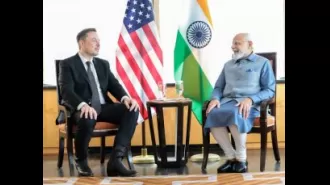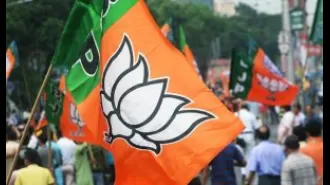Abortion's role in Queensland's election campaign.
An independent MP's promise and unclear stance from the opposition have brought the topic into the spotlight.
October 25th 2024.

As the state election in Queensland approaches, the topic of women's reproductive rights has become a major point of discussion in the political arena. But how did this issue come to the forefront? Let's take a look at the events leading up to this heated debate.
In 2018, Queensland decriminalised abortion, allowing termination up to 22 weeks of gestation. However, after that point, a woman must obtain approval from two doctors. Just a few weeks before the election, Independent MP Robbie Katter announced his intention to introduce a Private Members Bill to repeal the law. This sparked controversy and raised questions about the future of women's rights in the state.
Premier Steven Miles has made it clear that he sees this as a critical election issue, stating that a woman's right to choose is on the line. He has been a vocal advocate for women's reproductive rights, having been the health minister who introduced the decriminalisation of abortion. On the other hand, LNP leader David Crisafulli has stated that he believes in a woman's right to choose, but had previously voted against the decriminalisation of abortion in 2018.
Crisafulli has promised that there will be no changes to the current law if he is elected, but has not given a clear answer on whether he would allow a conscience vote for his party members if a bill to repeal the law is introduced in parliament. This would allow members to vote according to their own beliefs, rather than following party lines. When pressed on the issue during a debate, Crisafulli refused to give a direct answer, simply stating that there would be no changes to the law.
The debate on abortion has also spread to other states, with South Australia narrowly voting down a bill that would have criminalised late-term abortions. Coalition Senator Jacinta Nampijinpa Price has even called for the criminalisation of abortion to be on the national agenda. While abortion is currently legal in all states and territories in Australia, it is not protected by the constitution or federal law.
Jill McKay, the chief executive of Queensland-based organisation Children by Choice, expressed concern about the possibility of the right to abortion being repealed after years of advocacy. She questioned whether this means that women and pregnant individuals cannot be trusted to make decisions about their own healthcare. McKay emphasised that abortion is a medical procedure and should not be stigmatised or treated as a taboo topic.
The language and rhetoric used in this debate have been described as harmful and dangerous for women by McKay. She stated that politicians need to stop interfering with women's bodies and allow abortion to be a normal and essential part of healthcare. The outcome of this election will have a significant impact on women's rights and the future of reproductive healthcare in Queensland.
As Queenslanders head to the polls, the latest polling has shown a shift in support towards Labor, with Premier Miles closing in on Crisafulli as the preferred premier. The results of this election will be closely watched by not only women, but also their partners, parents, and grandparents. It is a crucial moment for the state and its people, and the outcome will have a lasting impact on the future of reproductive rights in Queensland. The votes will be counted tomorrow at 6pm.
In 2018, Queensland decriminalised abortion, allowing termination up to 22 weeks of gestation. However, after that point, a woman must obtain approval from two doctors. Just a few weeks before the election, Independent MP Robbie Katter announced his intention to introduce a Private Members Bill to repeal the law. This sparked controversy and raised questions about the future of women's rights in the state.
Premier Steven Miles has made it clear that he sees this as a critical election issue, stating that a woman's right to choose is on the line. He has been a vocal advocate for women's reproductive rights, having been the health minister who introduced the decriminalisation of abortion. On the other hand, LNP leader David Crisafulli has stated that he believes in a woman's right to choose, but had previously voted against the decriminalisation of abortion in 2018.
Crisafulli has promised that there will be no changes to the current law if he is elected, but has not given a clear answer on whether he would allow a conscience vote for his party members if a bill to repeal the law is introduced in parliament. This would allow members to vote according to their own beliefs, rather than following party lines. When pressed on the issue during a debate, Crisafulli refused to give a direct answer, simply stating that there would be no changes to the law.
The debate on abortion has also spread to other states, with South Australia narrowly voting down a bill that would have criminalised late-term abortions. Coalition Senator Jacinta Nampijinpa Price has even called for the criminalisation of abortion to be on the national agenda. While abortion is currently legal in all states and territories in Australia, it is not protected by the constitution or federal law.
Jill McKay, the chief executive of Queensland-based organisation Children by Choice, expressed concern about the possibility of the right to abortion being repealed after years of advocacy. She questioned whether this means that women and pregnant individuals cannot be trusted to make decisions about their own healthcare. McKay emphasised that abortion is a medical procedure and should not be stigmatised or treated as a taboo topic.
The language and rhetoric used in this debate have been described as harmful and dangerous for women by McKay. She stated that politicians need to stop interfering with women's bodies and allow abortion to be a normal and essential part of healthcare. The outcome of this election will have a significant impact on women's rights and the future of reproductive healthcare in Queensland.
As Queenslanders head to the polls, the latest polling has shown a shift in support towards Labor, with Premier Miles closing in on Crisafulli as the preferred premier. The results of this election will be closely watched by not only women, but also their partners, parents, and grandparents. It is a crucial moment for the state and its people, and the outcome will have a lasting impact on the future of reproductive rights in Queensland. The votes will be counted tomorrow at 6pm.
[This article has been trending online recently and has been generated with AI. Your feed is customized.]
[Generative AI is experimental.]
0
0
Submit Comment





